I was saving Belarusians from coronavirus but I was lying in a pool of blood in a prisoner transport vehicle
5 October 2020 | Maria Melehina, KYKY
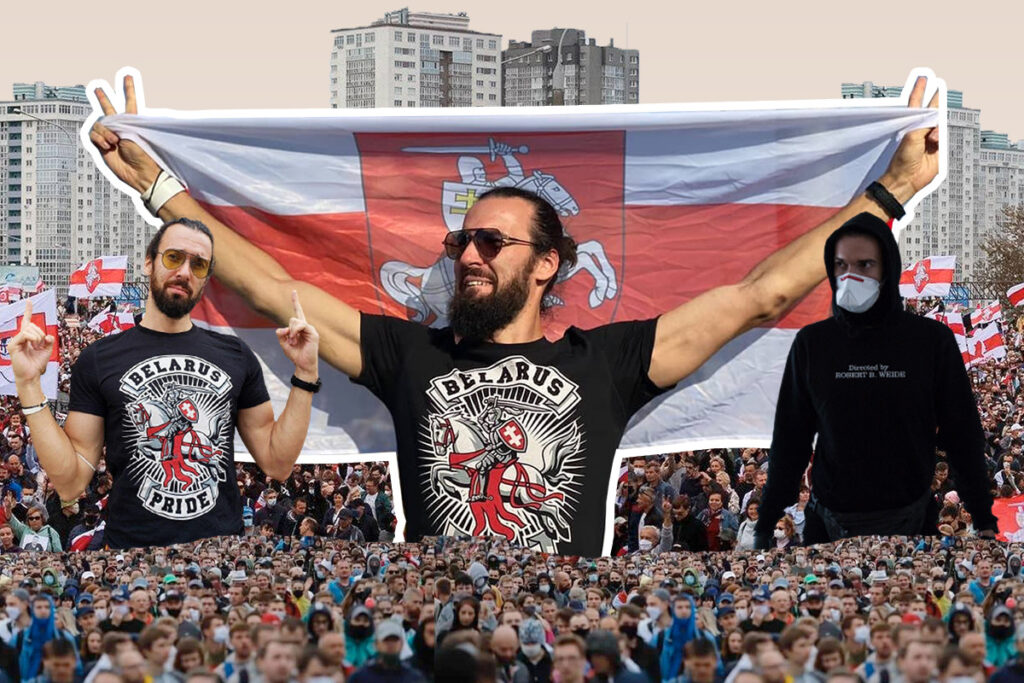
Andrey Tkachev, founder of the BYCOVID-19 initiative and member of the Coordinating Council, was detained on the first days of the post-election protests. In a prisoner transport vehicle (PTV), Andrey was brutally beaten until he lost consciousness. Three weeks after his release, he still could not raise his right arm above shoulder level. Two fingers lost sensitivity, as did (partially) the skin on one of the knee joints. Andrey is a rehabilitation trainer by profession, therefore, he says, he will definitely make it to recovery. But now in his homeland he is under the risk of criminal prosecution, and Andrey was forced to leave Belarus. Further in the article is his story.
Part 1. The birth of solidarity
Any non-state activity in Belarus is neither welcomed nor encouraged, therefore everything that I have been doing is based on enthusiasm. It is in my character that I cannot remain aloof from events that cause a strong emotional response. The BYCOVID-19 initiative began with realization that the state would not be able to “take out” the consequences of the epidemic without outside help. And we were the link that promptly responded to this threat with no bureaucracy and delays. As a rapid response unit, which could purchase and bring everything necessary to the hospital within 24 hours. For the Ministry of Health, with its bureaucracy, it would have taken weeks.
Of course, we had to interact with the state system, but that season was different. At that time the authorities somehow tried to communicate with civil society and business. Then the epidemic began to decline, doctors got better provision of medicine – supply channels were established. And at the end of June, we suspended our work. It was this story with COVID-19 that became the prologue of the incredible solidarity of Belarusians that we are seeing today.
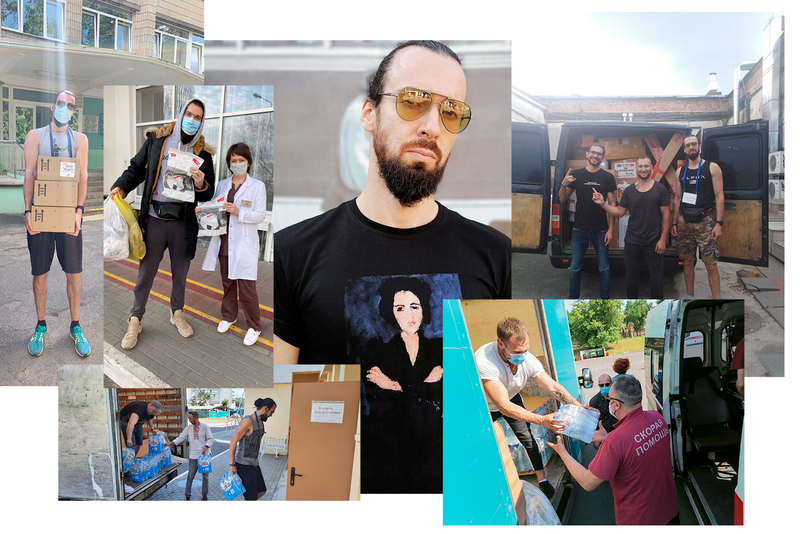
Source: KYKY
Even before the elections, I closely followed the entire movement. I had two favorites – Tsepkalo and Babaryka – adequate, smart people. And I realized that things could change in the country. Then Viktar Babaryka was arrested – and protests began, chains of solidarity. I also went to them, but I managed to avoid being detained. Later there was a story with the unification of three headquarters, and this was inspiring.
And when the preliminary results that Lukashenko had gained 80% were announced on the evening of 9 August – this absurd figure outraged everyone. It seemed that if we now take to the streets and show our disagreement, we will win. Unfortunately, it turned out to be not that simple. The system, which has been developing for 26 years, once again launched the mechanism of repression in an attempt to trample on the hopes and dreams of Belarusians about a bright future.
On the evening of 9 August, people began to go to the streets and move towards the Stella [a monument]. I went out too. It was a peaceful protest: a festive mood, many walked with white-red-white flags. But at some point, already on the way to the Stella, I heard the explosions of flashbang grenades – they cannot be confused with anything else – I play paintball. But the people continued walking anyway and stumbled upon a cordon of riot police. Nobody tried to attack, did not demonstrate aggression. Everyone chanted: “The police are with the people,” “OMON – put down the shields” and so on. I was standing right in front of the shields when the hard crackdown started. Light-noise grenades began to explode again, shooting began. The guys and I retreated and fled to the households – everything worked out well.
Part 2. Arrest and District Police Department
On the morning of 10 August, news about the wounded and beaten started coming – thanks to VPN. And the main question was – will people come out on the second day of the protests? In 2006 and 2010, the main protests were on election day. Then the dissidents were beaten, imprisoned – and the protest faded away. Therefore, there was little confidence. In the evening, with a friend of mine Kim Mazur – he was also a BYCOVID-19 volunteer – we decided to drive around the city to see how events would develop.
We reached the Stella. There was already a huge number of law enforcement officials, water cannons, and special equipment. Then we turned into one of the households along Rakovskaya street, where we saw a mutual friend. We parked the car and went out to say hello. It took a few minutes, after which we got back into the car, but we were blocked by an unmarked blue bus. The riot police got out of it, knocked on the window and gestured for us to get out. They put us in this blue bus, brought us to the Stella, and threw us into PTV. While being pushed in, we got several blows, but that was bearable.
We were brought to the Partizanskii Police Department. While getting out, riot policemen made a live corridor for us and arranged a so-called “river line” [the name of a kids game]. One policeman threw a person out of the PTV, and another one immediately hit him in the stomach. The man would “bend down.” And in this position, “facing the floor, hands behind the back,” it was necessary to go through the corridor under the blows of batons on both sides.
After that, we were put on our knees, face down to the floor, directly on the paving slabs. As soon as someone tried to raise their head or move, they immediately felt a blow on their back. There were 60 of us, and I was almost the last one to stand up. When they told me to get up, I couldn’t do it. For the first time in my life, my own body did not obey me. It was a strange feeling when instead of legs you have two macaroni that you can neither bend nor unbend. I think after that I got that insensitive area on my knee.
Source: Znak Znak
Then they took me under my arms and brought me to the basement, where a civilian man with a gun on his side was giving orders. Both the riot police and the police officers in the department obeyed him. I remember him well: if I see him, I will immediately recognize him. He ordered everyone to kneel down again, but when he left, the police officers allowed us to get up. And in general, most of the ordinary police officers did not touch us – they treated us with sympathy and loyalty.
Then there followed an inventory of the belongings: one by one they pulled us out into a hall, which was also located in the basement. When the procedure had been completed and all the chiefs had left, one of the employees allowed everyone to go to their personal belongings, turn on the phone and make a call. I think this was nonsense and a kind of a miracle. Then I managed to call my lawyer and tell him where I was. This policeman on duty encouraged us, talked to us like humans. It was evident that he was on our side.
At the end of the shift, this policeman said: “With my views I’ll soon be out of here. Guys, keep on! We will win!” I would like to meet this person and shake his hand.
And help him find a job via our fund of solidarity.
We spent the night in that hall of the police department. They gave us water and took us to the toilet. But closer to the morning, one of the chiefs arrived from the night crackdowns. He burst in right in his armor and a helmet and began to beat everyone. Many were already asleep: some sitting, some lying. It was later that I found out that on the night of 10 to 11 August, there were the most brutal clashes with the riot police.
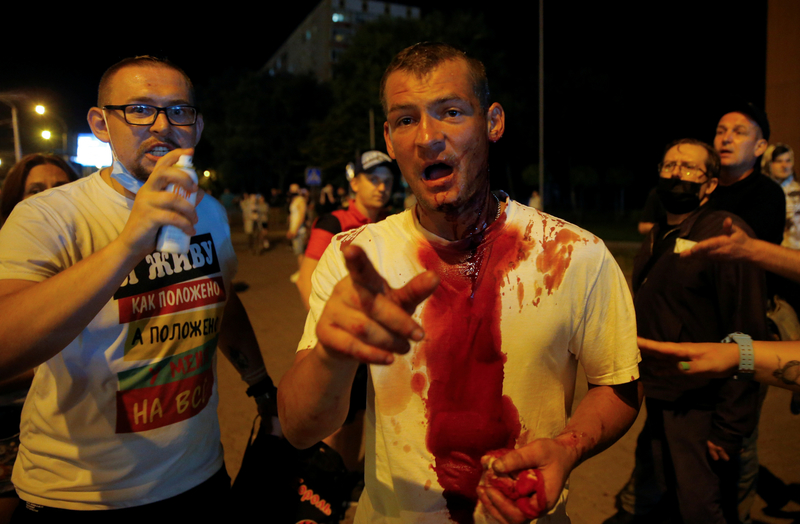
Source: REUTERS/Vasily Fedosenko via KYKY
We were again brought on our knees, faces to the floor, hands behind our backs. Blows and dirty language rained down on us. He shouted: “Beasts, how dare you raise your hands against the police?!” When he left, the police officers allowed us to take a comfortable position, but they warned us that if the riot police came here, we would be in trouble. Therefore, one of the policemen stood in the doorway on a lookout, while we were able to stretch our limbs a little. We didn’t know what to expect, and what a tough thing was going on that night on Akrestsina street, so I think we were lucky.
Part 3. Bloody road to a detention center
I have had administrative detentions and arrests before, and I roughly understood what would happen. I thought we would be taken to a court… In 2011, for the first time, I was arrested on a protest, and I was added to the lists of politically unreliable. In 2014 – then there was the World Hockey Championship – apparently, they decided to go through those lists. I was accused of disorderly conduct, they say, I was walking down the street, swearing, waving my arms, and also – I did not obey the lawful demands of the execution officers who allegedly passed by. Although I did not go anywhere, I didn’t swear at anyone and didn’t fight with anyone. This time I thought everything would go according to the same scenario: I will serve 15 days – no big deal. But the scenario began to unfold differently.
At about 11-12 am on 11 August we were taken to the inner courtyard of the police department carrying our personal belongings. And I realized that now we would be fucked. Two PTV were already parked there and riot policemen in full uniforms in balaclavas with batons were waiting.
We were lined up in two rows along the wall with our hands behind our backs. Kim stood next to me. And we stood out a lot: tattoos, I also have long hair. For them, such a person is a fascist who must be killed. And again that civilian person whom I had previously seen in the basement pointed at us and said: “With them – according to a special program.” They immediately flew up to us and began to beat black and blue.
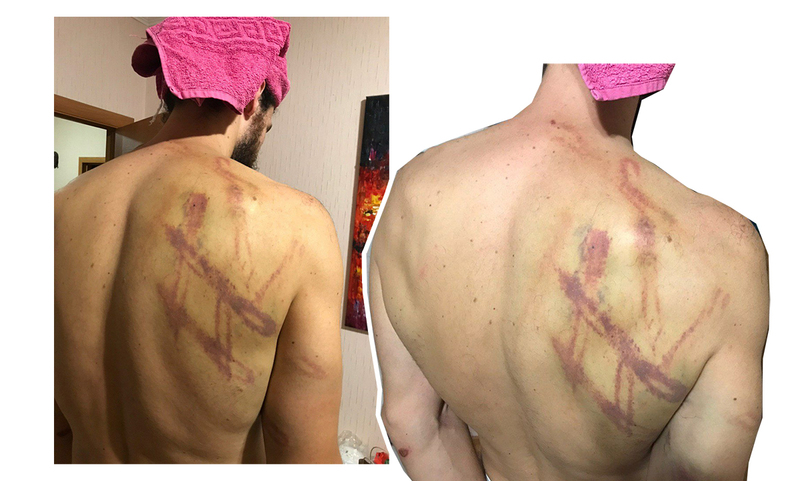
Source: KYKY
Then they tightened our hands with a strainer and began to throw us into a PTV. The “river line” was repeated: we were again chased through a living corridor of riot police with batons. In the PTV, you had to crawl on your knees over the people who were already lying in several layers. Someone also lay on me, and my legs were covered, so most of the blows fell on my back and head.
They beat us mercilessly. It felt like it went on for eternity. We were shouted that we are corrupt bitches who want to destroy the country. People tried to object but the more you argued or screamed in pain, the more they beat you. I gritted my teeth and said nothing. But I heard mature men crying out and moaning in pain, some of them fainted. Kim also got a lot – he was thrown into the far corner of the PTV, and two riot policemen finished him off in full. Right before leaving they counted our heads: you got a blow with a baton and you had to shout your number. If you shout quietly, you get it again. There were 18 people on the PTV.
Then the door slammed closed and, accompanied by the traffic police, we were taken to the city of Zhodzina. We lay in layers, all in sweat, blood, snot, and someone’s piss, face down on the floor. I tried to abstract as much as possible and even meditate, but it didn’t really work out. They beat us all the way. They called themselves “repair brigade,” and they “repaired” people, that means, they taught us sense.
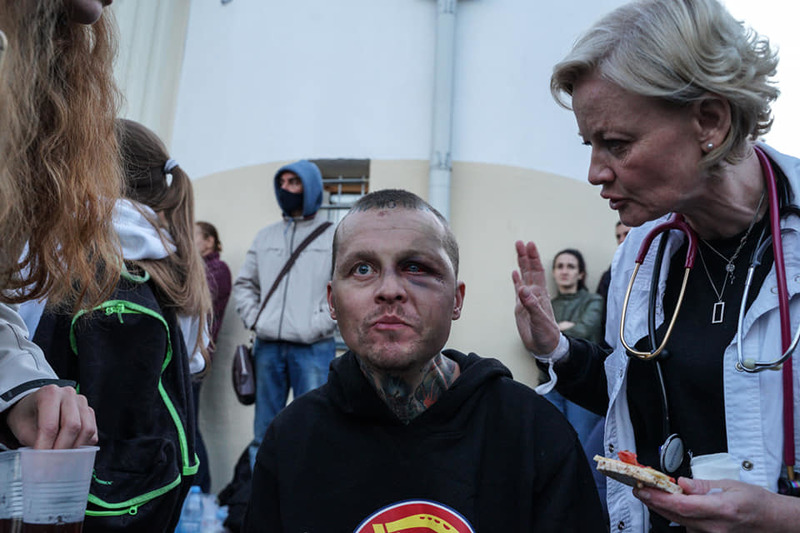
Source: Ksenia Golubovich, KYKY
Besides the fact that they beat us, the riot police walked on us. At some point, one of them stepped on my neck and began to press. As a result, I passed out. I don’t know how long I was unconscious. Someone poured cold water on my head, and I recovered myself.
After that they stopped beating us. Either they got afraid that they had gone too far, or they thought that they had achieved their goal, because I was not the only one who lost consciousness. They have a switch in their heads with two modes: “violence on” and “violence off.” And at that moment, it switched to the “off” position. They began to loosen plastic ties, because our arms being too tightly tied that they turned blue. Someone even cut them off. But it all was done by one person – the others did not care. This is back to the question if they all are beasts. Perhaps there are those who have retained some remnants of their humanity.
Part 4. Zhodzina and “a kind policeman”
Some time later, people in the PTV began to complain that they did not feel their legs, their hands, some felt bad. Some of us were allowed to sit down. They took out a few bottles of water and let them go around – it was enough for a sip per person. And then they began to talk to us in a human way. As if nothing had happened before. I don’t understand: how can you switch so quickly from a state when you actually kill a person before talking heart to heart with him?
The guys in the PTV began to tell their stories: where they work, where they were detained and why. If a person said that he was taken by accident, he heard in response: “You were just unlucky.” It was clear that the law enforcement officers had been heavily cheated ideologically. They had full confidence that we are all paid enemies, whose task is to destroy the country and sell it to the West. They saw themselves as the saviors of Belarus, for them it was an honorable mission. It was useless to persuade them otherwise. Infact, one of them pulled off his balaclava and lit up a cigarette. We all saw his face – he didn’t care. One guy recognized him – they went to the gym to the same coach. And this riot policeman said: “I don’t care about Tsikhanouskaya and Lukashenko. As long as they pay me, I will do what I do.”
We arrived in Zhodzina and waited in a queue – there were many PTVs. During this time they intimidated us: “You’re about to get totally fucked up – you will get the full menu.” But the guards were calm: for the first time we walked in normally, with no heads on the floor and hands up. In fact, a lot of people were brought in here so they could not cope with such a crowd. Therefore, for a start they took us to a courtyard – we stayed there for several hours. But they neither beat us nor humiliated us, they gave us a bucket for the toilet.
There, by the wall in that courtyard, I almost lost consciousness again – I began to feel sick and dizzy. That happens with head injury and brain concussion. One of the guards even swore at the riot police and called them “stone cold scums” when he saw the conditions as they brought people in.
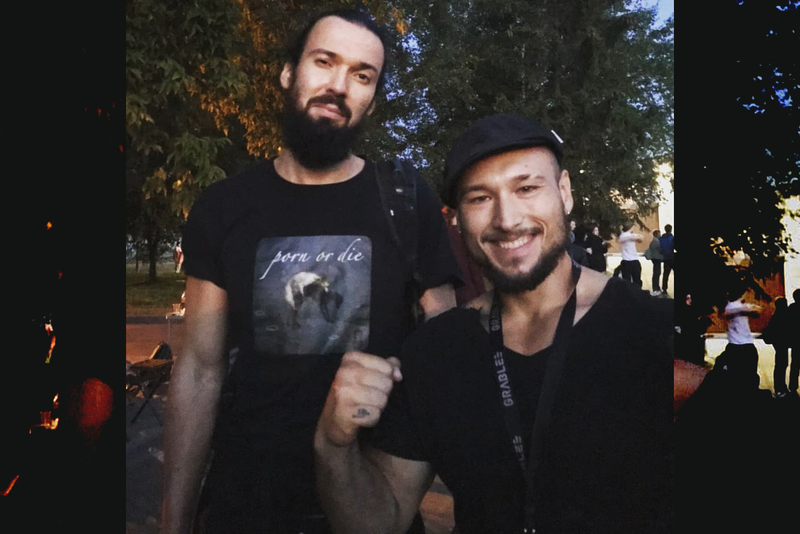
Source: KYKY
After that we, 30 people, were packed into a prison cell for ten. Kim and I ended up in the same cell where Sasha Vasilevich was before us [co-founder of KYKY, owner of an advertising agency Vondel , political prisoner – KYKY’s note] – we passed without meeting each other for only a half an hour. Of course, it was cramped, so some had to sleep on the floor. But Kim and I managed to occupy the “place on a palm” – on the second level, where we settled down head to tail.
In general, they treated us well in the temporary detention centre: they did not beat us, gave us food, they even gave me injections of anesthetic and antiemetic, and they also gave me a packet of ibuprofen. Compared to Akrestsina, it was a resort.
Part 5. Got released
On 14 August, after three days of arrest, they suddenly began to release us. We knew that the courts were taking place – a conveyor of sentences was launched. Several people from our cell had been convicted. Many, including me, didn’t. According to the law, after three days, if there is no court verdict, a person must be released. And this what has happened.
We were released in small groups of three or five. When I left the gates of the Temporary Detention Centre, I was confused. Firstly, because of fresh air. Secondly, there was a huge number of people: relatives and volunteers. When I walked through the crowd, it felt like in a war movie. People held photographs in their hands and asked with tears if I had seen any of their loved ones.
Then I approached the volunteers, saw friends and a tent camp. And the first question was: “Has the protest blown away?” But I was reassured and told that the protests had become even greater.
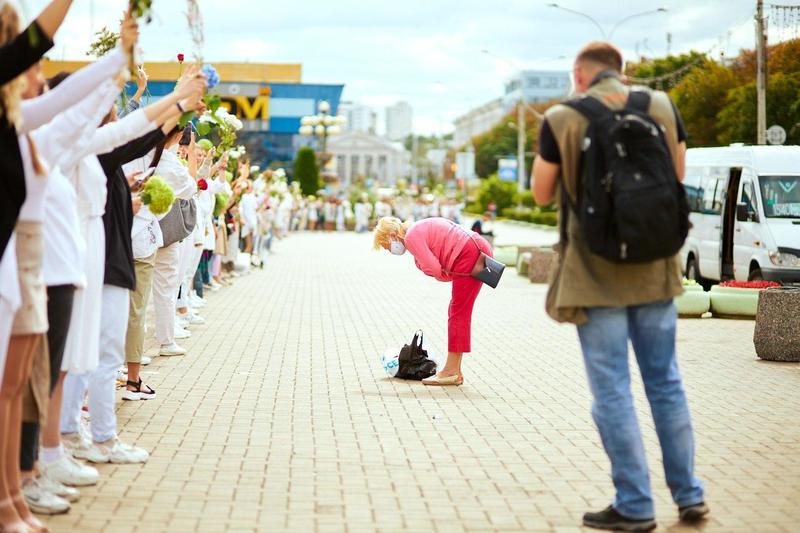
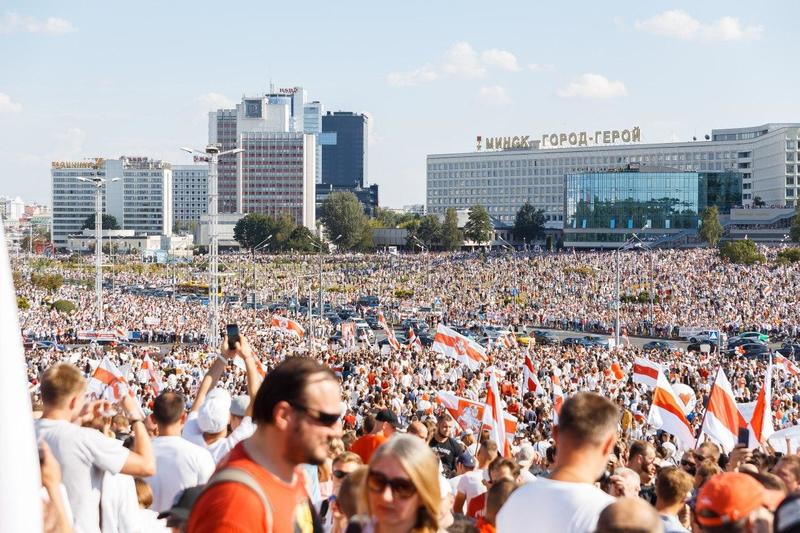
A day later, I went to the state’s hospital number 6 in Minsk for a medical examination, but finally I made a decision that I won’t write a claim to the Investigative Committee of the Republic of Belarus. I was diagnosed with a head injury, brain concussion, extensive hematomas, but this is nothing compared to what I saw at the walls of Akrestsina street, where I went later. The crippled people with horror in their eyes came out of the Temporary Detention Centre. Many ran away at once, without waiting for help. Then it turned out that they were intimidated: if they tell anything, their loved ones would be killed.
Part 6. Leaving the country
On 16 August a Sunday march took place in Minsk. The lawyer strictly forbade me to participate in it. Firstly, they could pull me to the court at any time in order to officially give me a “days sentence,” and secondly, a second detention could lead to criminal prosecution. Nevertheless, I could not resist and decided to take a ride around the city at least. And I saw an incredible amount of people. I rode saddling up the car door, holding a flag over my head and crying. Belarusians are so fucking awesome! And despite the whole wave of lawlessness and violence, the struggle continues – no one intends to give up! The phrase “my house is on the edge” has ceased to be relevant.
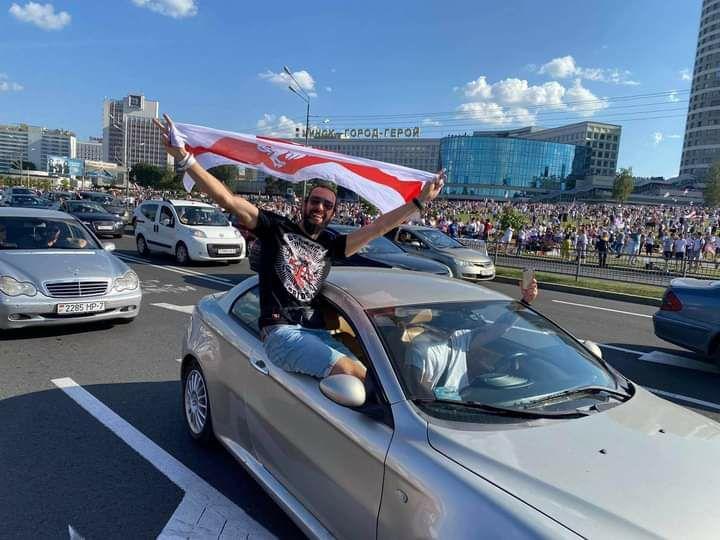
Source: KYKY
After that, I actively joined the volunteer movement, began to attend all rallies and Sunday marches regularly, tell about the situation in the country to the international media. And after one of these marches – when this “granddad” was running around with a gun with no magazine – the lawyer advised me either to lie low or leave the country. There was information that they would begin to tighten the screws against bloggers and activists. And this information came from three different sources, including the Investigative Committee.
I didn’t want to leave Belarus until the very end. At that time, I already collaborated with the Solidarity Fund to provide assistance to the Belarusians who suffered from repression. And behind the bars, I wouldn’t be able to help anyone. This cooperation began when I joined the Coordination Council. There I was engaged in identifying people involved in torture, organizing assistance for rehabilitation and travel abroad, providing financial assistance to the repressed. “Authority” definitely would not forgive me for this.
Therefore, when it became known about the beginning of the criminal process, I left for Ukraine. There were actually several hours to pack and depart. But there was also a plan B – in a trunk to Russia (laughs).
Now I continue to provide assistance through the solidarity fund. The main focus is athletes, because this is close to me: there are many connections and acquaintances. Of course, I am carried by an emotional swing between “we will win” and “I will never see home.” But I am determined. My planning horizon is two to three weeks. In fact, I am packed and ready to go, but this is figurative because I left with almost nothing.
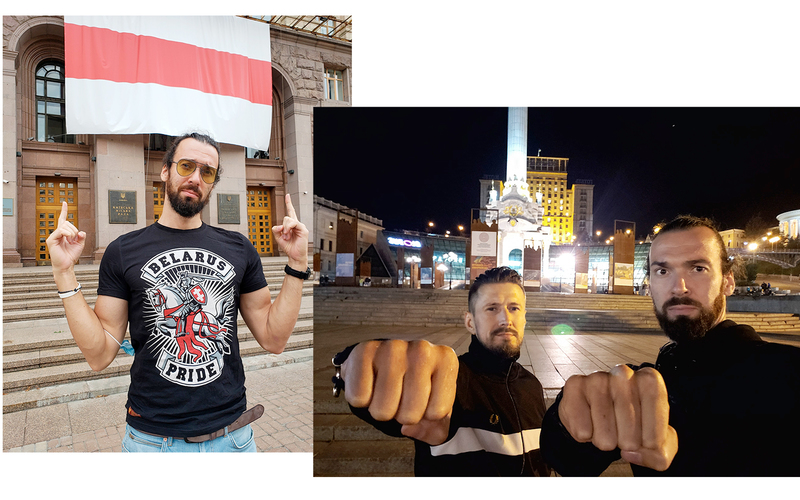
Source: KYKY
The main thing today is to stop the violence, to conduct an honest independent investigation so that the criminals in uniform do not feel unpunished. The authorities still do not understand that they have opened Pandora’s box. And suppressing the uncontrollable cruelty of the law enforcement forces will not be easy even for her if nothing changes. We will live in a country of the “untouchable” who have been officially licensed to torture, beat and kill. Moreover, violence can be used against everyone and at any time – no one is insured against: neither former law enforcement officers, nor doctors, nor journalists, nor athletes. We see it today. Every day the so-called power “breaks the floor” – the arrest of basketball player Yelena Leuchanka, which shocked the entire sports community.
But I am glad that the protest can no longer be stifled – people will come out anyway – no one intends to give up. This is a unique phenomenon of self-organization of civil society. And repression will only fuel resentment. Today the whole world is watching Belarus – there is an incredible wave of support and solidarity. Therefore, we have no other option but to win.